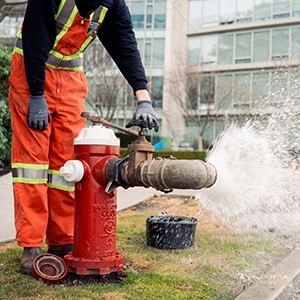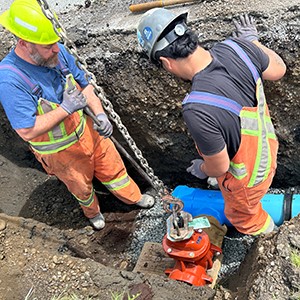Engineering & Public Works
The Engineering & Public Works Mission Statement is:
“To provide sustainable infrastructure, environmental leadership, and service excellence, which is essential to the health, safety, mobility, and quality of life for our community.”
Climate & Environment
A livable, healthy community requires a long-term commitment to economic, social, and environmental well-being. City Council has recognized the importance of improving Richmond’s sustainability performance by making it one of their top priorities of the Council Strategic Plan 2022-2026. The Climate & Environment Unit bolsters this Plan by helping the City assume a stronger, more proactive leadership role in sustainability performance. Working with other Divisions, utilities and community organizations, we develop integrated social, economic and environmental strategies and support or deploy initiatives that Richmond’s sustainability transition.
Sustainability
Richmond recognizes the importance of creating a sustainable community. It is a core strategy for achieving our corporate vision of "being the most appealing, livable and well-managed community in Canada". Working towards sustainability means living within limits, understanding the interconnections and interdependence among the economy, society and the environment, and the equitable distribution of resources and opportunities. Our vision of a sustainable Richmond is a healthy, safe and enriched island community with an innovative and prosperous economy and thriving natural systems, sustained for current and future generations.
Environmental Sustainability
The long-term livability of our city depends upon our natural environment – the quality of the air we breathe, the water we drink and the land upon which we live and grow our food.
The City practices continual improvement and collaboration with other levels of government, businesses, and the Richmond community to ensure that a healthy environment exists well into the future.
Examples of initiatives and policies include:
- integration of environmental policies into the City’s Official Community Plan;
- integration of community input into decision-making through the City’s Advisory Committee on the Environment (ACE);
- greening our corporate practices, including the environmentally-award winning City Hall;
- greening the built-form of the community and encouraging environmentally friendly lifestyle choices;
- protecting natural resources through City parks and Environmentally Sensitive Areas (ESA); and
- understanding and monitoring environmental quality through the City’s State of Environment report.
Chad Paulin
Director, Climate & Environment
Eng-Administration@richmond.ca 604-247-4672
Engineering Design & Construction
 The Engineering Design and Construction section is responsible for overseeing the design and construction of the civil infrastructure for the City of Richmond. The section upholds the City's design and construction standards with financially responsible and quality infrastructure. The City's civil infrastructure includes the road, lane and street system, public walkways and paths, street lighting, water distribution network, sanitary sewer system, storm sewer system, drainage ditches, and dikes. Services are delivered in four main areas:
The Engineering Design and Construction section is responsible for overseeing the design and construction of the civil infrastructure for the City of Richmond. The section upholds the City's design and construction standards with financially responsible and quality infrastructure. The City's civil infrastructure includes the road, lane and street system, public walkways and paths, street lighting, water distribution network, sanitary sewer system, storm sewer system, drainage ditches, and dikes. Services are delivered in four main areas:
Design and Project Management
 Detailed design and project management services are provided to deliver the current year's civil infrastructure capital program in a timely fashion within approved budgets. Design includes research of current technologies to deliver cost effective capital infrastructure.
Detailed design and project management services are provided to deliver the current year's civil infrastructure capital program in a timely fashion within approved budgets. Design includes research of current technologies to deliver cost effective capital infrastructure.
Construction Cost Estimating
Detailed civil construction cost estimates are provided to establish capital project budgets, and for project cost control.
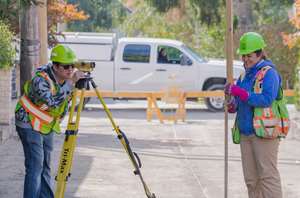 Surveys
Surveys
Engineering survey services are provided for capital project design, construction layout, and quantity estimates, maintenance of the City of Richmond survey monument and benchmark system, as well as monitoring of the City diking system.
Inspections
Construction inspections are provided to monitor the quality of materials and workmanship on City capital construction projects, and subdivision developments. Specialized services are also provided for closed circuit television inspection to assess installed underground pipelines, geotechnical materials testing to assess fills and pavements, and sewer flow monitoring to assess quantity of sewage discharge.
Director, Engineering EngineeringRequest@richmond.ca 604-276-4377
Eric Sparolin
Manager, Engineering Design & ConstructionEngineeringRequest@richmond.ca 604-247-4915
Engineering Planning
The Engineering Planning section is responsible for current and long-range infrastructure planning, development review, the Geographic Information System (GIS), and drafting standards.
Current Engineering Planning
In day-to day operations, Engineering Planning completes the design review and approval of all engineering drawings pertaining to single-family development applications, multi-family development applications and private utility designs. Aside from design reviews, they also manage submissions for Local Improvement Petitions (LIP), watercourse crossing applications and non-storm water discharge applications. Engineering Planning is responsible for monitoring the citywide water metering program and operating the various water conservation programs available for Richmond residents.
Long Range Engineering Planning
The department develops budgets and provides the long-term infrastructure planning for all underground utilities (storm drainage, water and sanitary), including private utilities (Telus, B.C. Hydro, Fortis Gas, etc.). Guided by the Flood Protection Management Strategy, they also plan and develop future dike improvements. Furthermore, they monitor the condition of roads, water, sanitary, sewer and dike networks to establish future upgrades and improvements to address population growth, climate change and ageing infrastructure.
Geographic Information System (GIS)
The Engineering Department’s key functions are planning, developing and sustaining civil infrastructure. Geographic Information System (GIS) technology provides the tools for creating, managing, and analyzing the data associated with civil infrastructure. Data helps organizations and governments work collaboratively on sustainable development and GIS is a key resource in supporting all phases of the infrastructure life cycle. Engineering Planning uses location intelligence for civil infrastructure as well as interfacing with other software as a resource for asset management, maintenance and benchmarking.
Drafting
The department prepares drafting standards to ensure drawings meet the City’s engineering standards. Engineering Planning maintains over 100,000 engineering drawings either in paper or digital format and creates maps for clients ranging from residents to City Council.
Manager, Engineering PlanningEngineeringRequest@richmond.ca 604-244-1281
Environmental Programs
Blue Box and Blue Cart Recycling
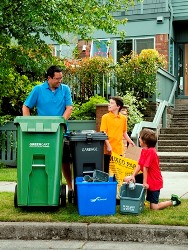 Weekly curbside collection for recycling paper and newsprint, glass, plastic containers, empty aerosol cans, milk cartons, plastic/paper drink cups, spiral wound containers, and tin and aluminum containers. This program is provided to single-family homes, town homes and multi-family units.
Weekly curbside collection for recycling paper and newsprint, glass, plastic containers, empty aerosol cans, milk cartons, plastic/paper drink cups, spiral wound containers, and tin and aluminum containers. This program is provided to single-family homes, town homes and multi-family units.
Green Cart Recycling
Collection for recycling foods scraps and yard trimmings. This program is provided to residents in single-family homes and town homes as well as multi-family complexes.
Recycling Depot
Drop-off service for products ranging from yard trimmings and household items, to hazardous materials and take-back program products. This service is available to all residents and in limited quantities for commercial operators. The Depot also sells compost bins, rain barrels, Garbage Tags and Garbage Vouchers.
Curbside Garbage Collection
Bi-weekly curbside collection of garbage, not including banned items such as hazardous waste and materials that can be recycled, is available to residents in single-family homes and some townhomes.
Extra Garbage Disposal
Garbage disposal tags and vouchers for the Vancouver Landfill provide options for residents when they need to dispose of additional garbage or large items.
Large Item Pick-Up Program
 Residents in single-family homes, some townhomes and some multi-family complexes can arrange for collection of six large household items per year.
Residents in single-family homes, some townhomes and some multi-family complexes can arrange for collection of six large household items per year.
Community and School Engagement
Through partnerships with students, teachers and the Richmond School District, the City conducts education, public outreach and volunteer opportunities to increase understanding of recycling and the benefits of reducing waste.
Composting at Home
Support for residential composting includes the sale of compost bins, a composting demonstration garden and related workshops. These services are available to all residents.
Litter Collection
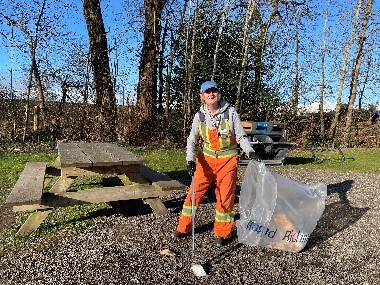 City crews collect litter and abandoned waste from parks, bus stops, dikes and open spaces at various frequencies to meet peak seasonal demands.
City crews collect litter and abandoned waste from parks, bus stops, dikes and open spaces at various frequencies to meet peak seasonal demands.
The City’s “Partner for Beautification” program encourages the community to become involved in litter pickup and other clean-up initiatives by “adopting” various areas throughout the city. This program goes a long way towards enhancing Richmond’s overall appearance.
Kristina GrozdanichManager, Recycling and Waste Recovery Environmental Programs: 5599 Lynas Lane, Richmond,
British Columbia, V7C 5B2 GarbageAndRecycling@richmond.ca 604-244-1280
Recycling & Garbage Information Line: 604-276-4010
Fleet Operations
Fleet Operations provides, manages and operates a mixed fleet of vehicles, heavy equipment and an assortment of specialized work units to support all City business units. The Section works in compliance with Provincial and Federal safety regulations. This section is responsible for Vehicle Acquisitions, Fueling Services, Equipment, Operational, Maintenance and Repair Services, and Driver Training. The City’s Green Fleet Action Plan guides operations of the vehicle fleet toward emission reduction targets.
Vehicle Acquisitions
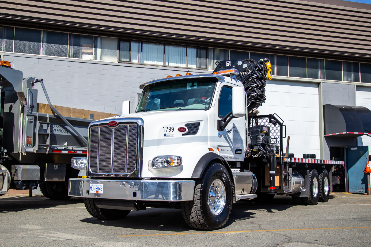 Undertakes long-term vehicle replacement planning. Works with various City business units to identify vehicle and equipment needs and facilitates the procurement and commissioning process.
Undertakes long-term vehicle replacement planning. Works with various City business units to identify vehicle and equipment needs and facilitates the procurement and commissioning process.
Fueling Services
Coordinates procurement for the various types and locations for furling for City vehicles and equipment including operating a fuel station at the City Works Yard. Coordinates the acquisition, installation, maintenance and repair of all electric vehicle charging stations for public and corporate fleet vehicles.
Equipment
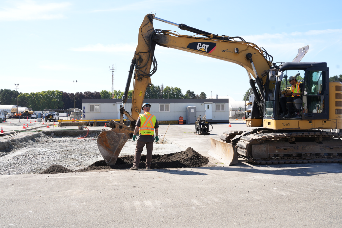
Provides skilled operators for trucks, equipment, welding services to the City. Coordinates the hiring process for vendor-provided equipment to support maintenance and capital project work delivered by City forces.
Operational
Ensures compliance-based operation of the City’s vehicle and equipment fleet for all aspects of operating a commercial vehicle fleet. Ensures asset accountability and performance through operation of the AVL/GPS system for all City vehicles and equipment. The fuel management system ensures fuel security and a dedicated fleet asset management system ensures sound cost and asset capture management for fleet vehicles and equipment.
Maintenance and Repair Services
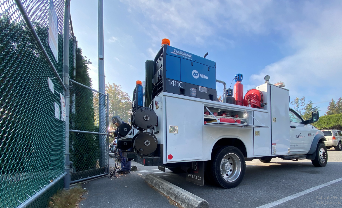 Maintains and repairs the City's fleet, equipment and small equipment with certified mechanics operating on two shifts. Welding staff support vehicle outfitting and maintenance. All services are conducted in accordance with the Commercial Vehicle Safety Inspection Program..
Maintains and repairs the City's fleet, equipment and small equipment with certified mechanics operating on two shifts. Welding staff support vehicle outfitting and maintenance. All services are conducted in accordance with the Commercial Vehicle Safety Inspection Program..
Driving Training
Provides driver training and education programs to ensure safe practices, mitigate liabilities and driver benefits through reduced insurance premiums. Full commercial driver training is carried out and licensing issued as required by Provincial regulations. This section conducts vehicle accident investigations and implements remedial measures as part of continuous driver/operator improvement.
Green Fleet Action Plan
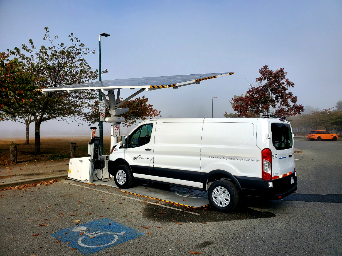 Richmond’s action plan and business strategy for improving fuel efficiency, reducing greenhouse gas emissions and reducing overall environmental impact of equipment and vehicle operations.
Richmond’s action plan and business strategy for improving fuel efficiency, reducing greenhouse gas emissions and reducing overall environmental impact of equipment and vehicle operations.
The Green Fleet Action Plan highlights actions taken to reduce corporate emissions, establishes proposed reduction targets, and presents recommendations and actions to achieve them.
Manager, Fleet Operations
PWServiceCentre@richmond.ca 604-233-3301
Public Works
- Public Works Administration
- Fleet Operations
- Environmental Programs
- Roads & Construction Services
- Sanitary Sewers
- Flood Protection
- Water Services
The mandate of the Public Works Administrative Services Section is to provide support services to all Public Works personnel at the Works Yard in the following major areas:
- Dispatch Operation
- Administrative Services
- Health and Safety Training and Management
- Budget Management
- Asset Management
Services Provided
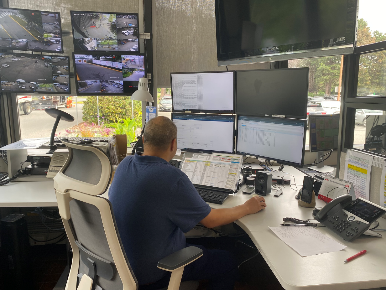 24 hour Dispatch Operation which records and relays a variety of messages, instructions and enquiries between the public, field crews and supervisory staff. Dispatches staff to respond to after-hours emergencies or events reported by the public. Monitors key City systems such as SCADA and road temperature sensors to alert subject matter experts to anomalies which helps to avoid service interruptions for residents.
24 hour Dispatch Operation which records and relays a variety of messages, instructions and enquiries between the public, field crews and supervisory staff. Dispatches staff to respond to after-hours emergencies or events reported by the public. Monitors key City systems such as SCADA and road temperature sensors to alert subject matter experts to anomalies which helps to avoid service interruptions for residents. - Public Works Service Centre which processes vendor payments and facilitates the administrative functions for water disconnects, damage deposits and other service requests.
- Administrative Services provides administrative support services to the various business units within operations inclusive of staff timekeeping, purchasing and maintaining equipment and supplies.
- Health and Safety Training and Management coordinates Public Works health and safety programs and training for staff to ensure work delivered in the community is safe for staff and the public.
- Budget coordination and preparation of the annual operating, utility and capital budgets for Engineering and Public Works, and monitoring expenditures.
- Asset Management is responsible for administration and maintenance of the City’s engineering and public works infrastructure asset management system which supports maintenance and servicing efficiency.
Director, Public WorksPWServiceCentre@richmond.ca 604-233-3338
Jatinder Johal
Manager, Public Works Administration PWServiceCentre@richmond.ca 604-244-1262
City Works Yard
5599 Lynas Lane
Richmond BC V7C 5B2
604-270-8721 Works Yard Dispatch (24 hours everyday)
Hours of Operation
- Most crews and Foreman: Mon-Fri: 7:30am-4:00pm
- Public Works Service Centre: Mon-Fri: 8:00am-4:00pm
- Garage (afternoon shift): Mon-Fri: 3:30pm-1:00am
- Recycling Depot: Mon-Sun: 9:00am-6:15pm (Closed on statutory holidays)
Roads & Construction
Roads and Construction Services maintains the City’s roads and sidewalks, is responsible for the City’s winder snow response operations and supports other sections of the City through skilled construction trades.
Roads Maintenance
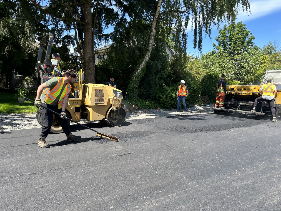 In addition to responding to reports for repairs, including potholes, road cuts, vibration complaints and sinkholes, Roads & Construction provides annual maintenance programs ensure the integrity of Richmond's road network through fiscally responsible and timely maintenance. Key roads maintenance services include:
In addition to responding to reports for repairs, including potholes, road cuts, vibration complaints and sinkholes, Roads & Construction provides annual maintenance programs ensure the integrity of Richmond's road network through fiscally responsible and timely maintenance. Key roads maintenance services include:
- Asphalt maintenance
- Asphalt capping (April - October, annually)
- Asphalt crack sealing
- Laneway maintenance and dust removal
- Sidewalk maintenance including curbs and gutters
- Street cleaning
- Pothole repair
Snow and Ice Control
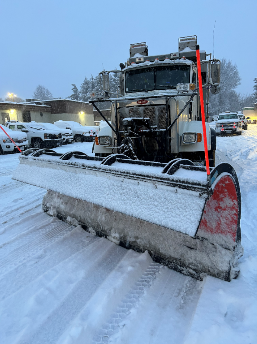 Conducts anti-icing and de-icing of roads and the removal of snow as per Policy 7013, Roadways – Ice and Snow Removal which defines the priorities of ice and snow clearing on the City’s public roads, highways, overpasses, lanes and bus stops.
Conducts anti-icing and de-icing of roads and the removal of snow as per Policy 7013, Roadways – Ice and Snow Removal which defines the priorities of ice and snow clearing on the City’s public roads, highways, overpasses, lanes and bus stops.
Additional information including a snowplow tracker application to help residents see which roads have been serviced during snow events, is available at richmond.ca/winter.
Roads Construction
City construction plays a significant role in new road and active transportation infrastructure. Additional construction performed by the City includes:
- Preparing sub-base for the installation of curb, gutter, sidewalk, road widening and conduit for traffic signals.
- Re-instatement of asphalt surface after installation of water/sewer services or utility cuts.
Trades
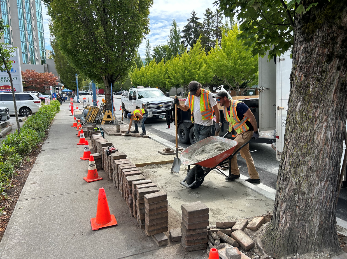 Ensures the quality of workmanship and materials meets the City’s standards and specifications in the maintenance and minor construction of Richmond's infrastructure. This includes providing carpentry, cement and masonry finishers and paint services support to a wide range of City functions.
Ensures the quality of workmanship and materials meets the City’s standards and specifications in the maintenance and minor construction of Richmond's infrastructure. This includes providing carpentry, cement and masonry finishers and paint services support to a wide range of City functions.
Lines and Signs
- Application and maintenance of road markings including road lines and crosswalk markings on City roads.
- Production, installation and maintenance of traffic and regulatory signage.
Manager, Roads & Construction PWServiceCentre@richmond.ca 604-244-1252
Sanitary Sewers
The Sanitary Sewers maintains and operates the sanitary sewer network, including pump stations. Real time monitoring and control of station operations is managed through Supervisory Control and Data Acquisition (SCADA) systems. Skilled electricians support the SCADA network and maintain electrical infrastructure such as street lighting.
Sanitary Sewer Network
Responsible for ensuring that waste water is collected and conveyed through 800 km of sanitary mains to the sanitary pump stations. This section maintains a network of forcemains, manholes, inspection chambers and service connections. Maintenance work includes preventative maintenance and repairs to reduce blockages and sewer overflows. Crews respond to service requests, system disruptions or other operational issues that arise.
Pump Stations
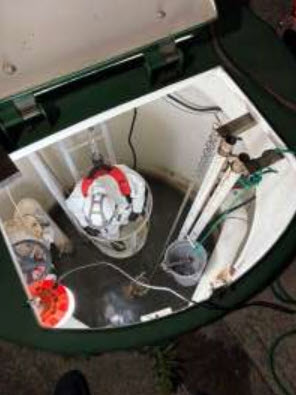 Ensures that all 154 sanitary pump stations are operating to ensure the collection of the sanitary waste is pumped to the forcemain which moves the material to Metro Vancouver treatment plants for processing. Each station is monitored remotely and regularly inspected to ensure safe and continuous operation. Preventative maintenance of pumps, electrical components and control systems allow for timely trouble shooting of issues to maintain uninterrupted services.
Ensures that all 154 sanitary pump stations are operating to ensure the collection of the sanitary waste is pumped to the forcemain which moves the material to Metro Vancouver treatment plants for processing. Each station is monitored remotely and regularly inspected to ensure safe and continuous operation. Preventative maintenance of pumps, electrical components and control systems allow for timely trouble shooting of issues to maintain uninterrupted services.
Radio Communications
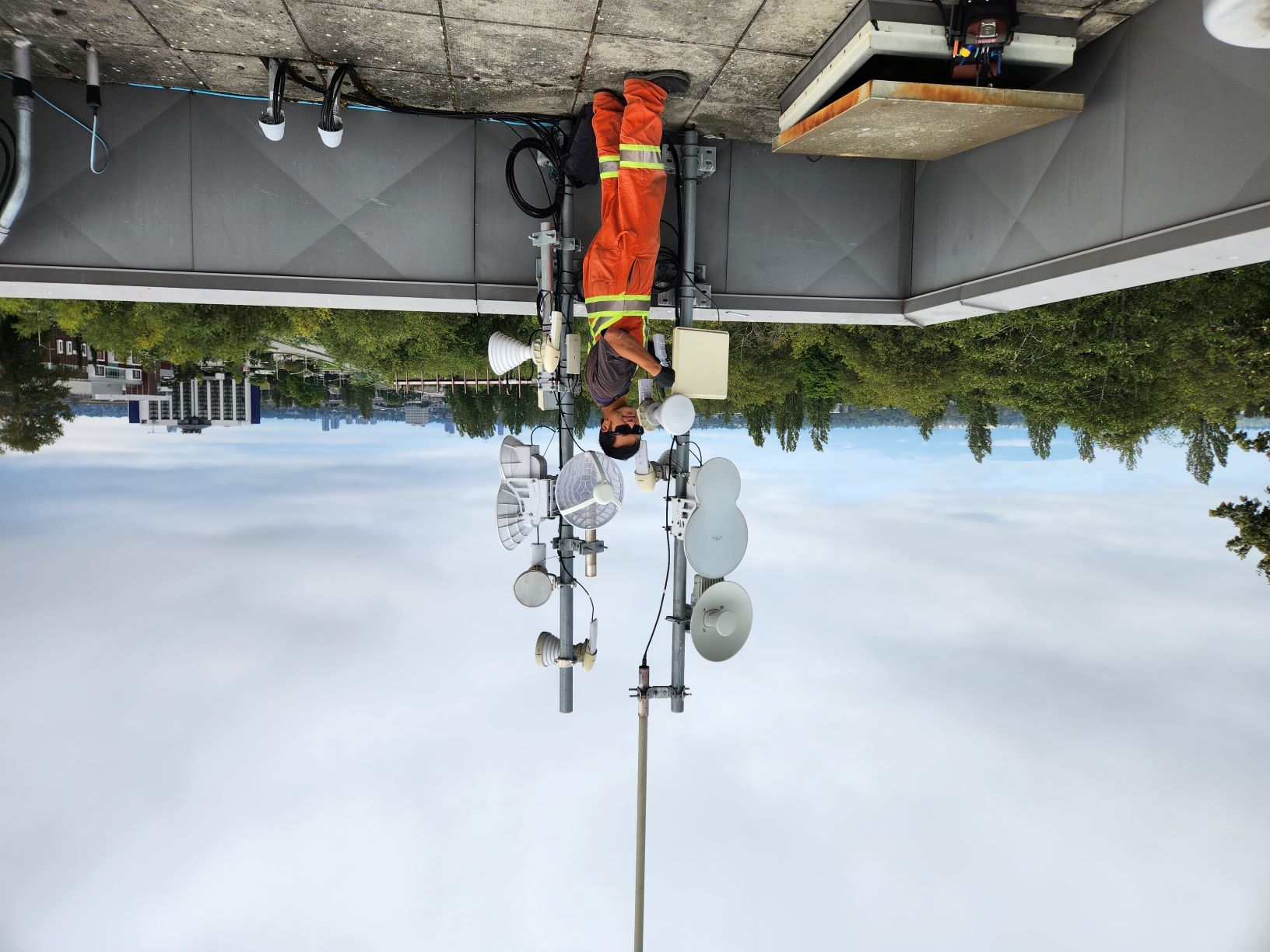 The City’s Radio Communications team manages the City’s Supervisory Control and Data Acquisition (SCADA) system, which enables real-time monitoring and control of critical infrastructure across multiple departments. This includes sanitary and drainage pump stations, water pressure reducing valves, and river level sensors that help track flood risks and inform operational planning in response to changing climate conditions. This section also manages the City’s wide-area radio communications, including handheld radios for field staff and communication systems used during emergency response.
The City’s Radio Communications team manages the City’s Supervisory Control and Data Acquisition (SCADA) system, which enables real-time monitoring and control of critical infrastructure across multiple departments. This includes sanitary and drainage pump stations, water pressure reducing valves, and river level sensors that help track flood risks and inform operational planning in response to changing climate conditions. This section also manages the City’s wide-area radio communications, including handheld radios for field staff and communication systems used during emergency response.
Electrical
Skilled trades electricians maintain and upgrade electrical systems that power sanitary and drainage pump stations, street lighting, electrical vehicle charging and civic buildings. This section supports a wide variety of business units to ensure electrical service to critical infrastructure is maintained during emergencies.
Victor Ma
Manager, Sanitary Sewers PWServiceCentre@richmond.ca 604-204-8598
Flood Protection
Flood Protection is responsible for the maintenance, upgrade and operation of the City’s drainage and diking infrastructure. Staff take a number of measures both in advance of, or in response to river or weather events to ensure the protection of property and road safety.
Drainage Operations
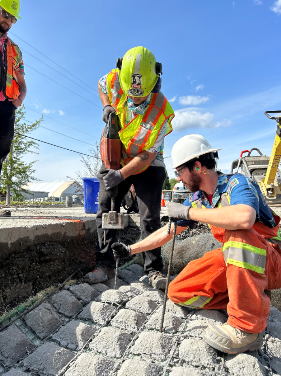 Ensures the drainage and conveyance of rainwater and runoff. Crews operate the City’s stormwater collection system which is compromised of box culverts, pipeline, ditches, canals, manholes, catch basins and inspection chambers in addition to ongoing maintenance programs. Drainage Operations responds to demand calls and weather events quickly to resolve drainage issues as they arise.
Ensures the drainage and conveyance of rainwater and runoff. Crews operate the City’s stormwater collection system which is compromised of box culverts, pipeline, ditches, canals, manholes, catch basins and inspection chambers in addition to ongoing maintenance programs. Drainage Operations responds to demand calls and weather events quickly to resolve drainage issues as they arise.
Drainage Pump Stations & Irrigation
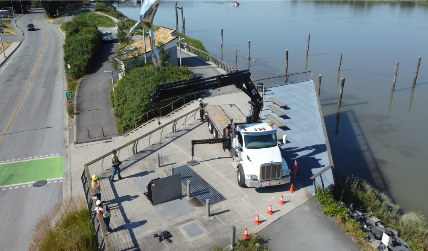 Operates the City’s 39 drainage pump stations, where the stormwater collection system conveys water to pump rain and ground water deposited in the open ditches and pipes to the river. When running at full capacity drainage pump stations have the ability to pump up to 5.2 million litres per minute. Stations are visited on a daily basis to ensure water access to the pumps is maintained.
Operates the City’s 39 drainage pump stations, where the stormwater collection system conveys water to pump rain and ground water deposited in the open ditches and pipes to the river. When running at full capacity drainage pump stations have the ability to pump up to 5.2 million litres per minute. Stations are visited on a daily basis to ensure water access to the pumps is maintained.
Irrigation water is conveyed to the agriculture sector through designated irrigation ditches. During growing and harvesting seasons operations staff liaise with the Farmers’ Institute and individual crop and berry farmers for water requirements to support farming operations.
Dike Maintenance & Operations
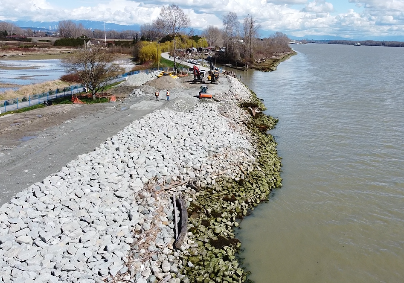 The City’s 49 km of engineered dike provides protection from sea level rise and the Fraser River. Climate change continues to increase water levels and the intensity of river flow resulting from rain events or freshet. Staff regularly monitor the diking infrastructure and undertake regular maintenance and repairs in accordance with Provincial Diking Authority requirements. Key activities include:
The City’s 49 km of engineered dike provides protection from sea level rise and the Fraser River. Climate change continues to increase water levels and the intensity of river flow resulting from rain events or freshet. Staff regularly monitor the diking infrastructure and undertake regular maintenance and repairs in accordance with Provincial Diking Authority requirements. Key activities include:
- Regular inspection for visible areas of damage due to animal dens, erosion or wave action, rip rap slippage, high tides and contractors with a dike crossing permit inspection;
- Monitoring of the dike during high water events to ensure a breach or defect is responded to immediately;
- Annual survey of dike elevations to ensure changes over time are recorded and actioned;
- Schedule annual brushing program for dike crests and slopes. This entails the removal of all vegetation growth other than grass during the dormant months from November to March; and
- Liaison with the Department of Fisheries and Oceans, the provincial Dike Inspector, and Fraser River Estuary Management Program agencies regarding compensation for habitat areas when external dike repairs are required to the foreshore prior to commencement of such work in assigned Red Zones.
Manager, Flood Protection PWServiceCentre@richmond.ca 604-276-4032
Transportation
Mandate
Under the direction of Richmond City Council, the overall mandate of the Transportation Department is to provide the most efficient, effective and safe service to enhance the mobility of people and goods in Richmond.
Vision
Our community making sustainable transportation choices.
Mission
To provide a safe and effective travel environment for a liveable community.
What We Do
The Transportation Department is primarily responsible for establishing the planning and design policies that help shape the transportation system of the City. These policies include the planning and functional design of the City's transportation infrastructure of roads, bicycle lanes, sidewalks, crosswalks, and transit amenities, as well as traffic operation controls such as traffic signals and signage, on-street parking, traffic calming measures, and development access.
Organization
The Transportation Department has three major sections:
Transportation Planning
Responsible for developing plans that best serve the public's current and future travel needs, establishing the priority, scope, and functional design of transportation improvements, reviewing the transportation requirements of new developments, and working with external agencies on local and regional transportation improvements such as transit services, major highways, bridge crossings, and policy/funding/governance issues.
Traffic Operations
Responsible for the design and maintenance of traffic and parking signs, pavement marking, pedestrian crosswalks, school frontages for drop-off/pick-up, issuance of special vehicle and event permits, analysis of traffic accident data, special traffic and parking control, and handling of public complaints on traffic and parking related matters.Traffic Signals
Responsible for the design, construction, operation, and maintenance of the City's traffic signal system including new installations at intersections and railway crossings, signal timing, detector loops, communications network, fire department pre-emption, automated traffic volume counting, and centralized control of all traffic signals under the City's jurisdiction.
transportation@richmond.ca 604-276-4271
Traffic Signals
TrafSig@richmond.ca 604-247-4616
Traffic Operations
TrafOps@richmond.ca 604-204-8707
Water Services
Richmond Water Services provides, operates and maintains services that are necessary to supply safe, reliable, high-quality drinking water to the public and to ensure water is readily available for fire protection. To support the delivery of water where and when it is needed, Water Services is responsible for maintaining Richmond’s complex water distribution system as well as supporting water conservation and providing customer service and emergency response as needed
Ensuring Water Quality
The City of Richmond's Water Services section works with Metro Vancouver to provide high-quality drinking water to residents and businesses that meets or exceeds all government safety standards. City crews flush Richmond’s water distribution system to expel accumulated silts and organic matter and collect weekly water samples, which are taken to Metro Vancouver laboratories for analysis to ensure they meet safety standards
In addition to high quality tap water provided directly to homes and businesses, the City also provides water in the community through its network of permanent and portable water fountains and through misting stations to help people stay cool in the hot weather.
Construction & Maintenance
A water distribution system needs regular maintenance and upgrades, and the City of Richmond’s Water Services crews do that critical work year-round. Maintenance includes repairs, flushing to maintain water quality, inspections and monitoring of the water system. Construction work includes replacing aging infrastructure as well as installing new infrastructure as needed to meet increased demand for water as the community grows.
Key infrastructure in the water distribution system includes watermains, water connections to customers, valves and pressure-reducing valve stations, and water meters.
Water Services also supports fire protection by maintaining fire hydrants, water volume and pressure levels to ensure hydrants can provide large volumes of water during firefighting efforts.
Water Conservation
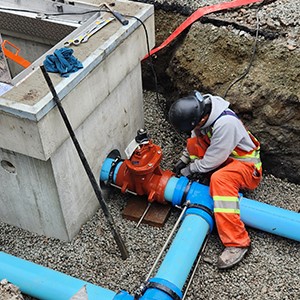 Richmond Water Services implements Metro Vancouver’s regional watering restrictions that apply from May to October each year. These restrictions are required to conserve the region's limited water supply, which is particularly critical throughout the summer months. Richmond also supports year-round water conservation through its Simple Habits Save Water education and awareness its campaign, and with its water meter program. As well, residents can reduce water use at home using Richmond’s Toilet Rebate Program and Rain Barrel Program.
Richmond Water Services implements Metro Vancouver’s regional watering restrictions that apply from May to October each year. These restrictions are required to conserve the region's limited water supply, which is particularly critical throughout the summer months. Richmond also supports year-round water conservation through its Simple Habits Save Water education and awareness its campaign, and with its water meter program. As well, residents can reduce water use at home using Richmond’s Toilet Rebate Program and Rain Barrel Program.
Customer Service & Outreach
Water Services responds to a large volume of requests for service from the public, including "turn-off" and "turn-on" for private repairs, location of water utilities, flow testing, advice on repairs, and inquires on water quality, low pressure, frozen service connections, water meters and water restrictions.
The City helps the community learn about water through outreach events such as Project WET and the Public Works Open House.
Emergency Service Response
Water Services is available for emergency water service response 24 hours a day, seven days a week. Types of water service emergencies include pipe damage and water leaks resulting in overland flooding. Emergency response is an important function in maintaining a pressurized water system, reducing water waste and avoiding or minimizing the amount of damage to property, both private and public.
The City also operates a Mobile Emergency Response treatment trailer for use during major emergency if the City’s water is contaminated or unavailable.
City 24 Hour Emergency Line: For broken watermains or other water-related emergencies, call the City Emergency Line at 604-270-8721.
Bryan Shepherd
Manager, Waterworks PWServiceCentre@richmond.ca 604-233-3334


